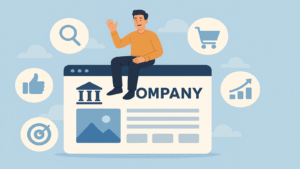10 Advantages You ll Gain by Building a Website for Your Company
Introduction
In this era of rapid digital transformations in today’s market, having a website for any company has become an indispensable element. Websites serve as the main points of contact between companies and customers. They provide a comprehensive platform to market products and services and convey the unique values of the company. With the increasing reliance on the Internet in people’s daily lives, having a website helps companies engage with their target audience and stand out in a competitive environment.
Furthermore, a website allows companies to establish a strong digital identity, which boosts their credibility and trust in the eyes of customers. Customers increasingly tend to search online for product and service information before making purchasing decisions. Companies that lack websites may lose significant opportunities to attract potential clients and achieve growth. A website acts as an always-on showcase, whose content can be easily and frequently updated to align with current trends.
Moreover, digital transformations have not only affected marketing methods but also consumer behavior. Today, many customers prefer to shop online because of the convenience and ease this method offers. Your website can serve as an e-commerce platform, allowing you to sell directly to consumers without relying on intermediaries, giving you the chance to realize higher profit margins.
Thus, creating a website is a strategic move toward success and growth, whether your company is a startup or already established. In the following sections of the article, we will explore ten major advantages that companies will obtain when they take the step of building an online presence.

Increased Visibility & Broader Reach
Building a website for your company is a crucial step in expansion and increasing visibility. The success of any business in today’s digital age depends on its ability to reach a wide audience and attract potential customers. A company website offers an effective platform to introduce your products and services, enabling firms to expand their market recognition.
Search engine optimization (SEO) strategies are powerful tools for improving your site’s ranking in search results. By using appropriate keywords and engaging content, a site can climb up in search results, increasing the chance that audiences will interact with it. Proper SEO techniques ensure that your website appears in the first pages of search engine results, which in turn leads to more visits and more potential leads.
Additionally, digital marketing plays a major role in boosting visibility. Through strategies like social media marketing, companies can directly engage with target audiences and enhance brand awareness. Targeted advertising campaigns on digital platforms allow for effective results with limited resources, supporting greater reach and efficient audience targeting.
When you integrate these elements, having a company website can lead to greater visibility and reach to a broader audience, helping you achieve business goals and expand opportunities in the long term. Thus, investing in a digital platform is a strategic step toward sustainable success and growth in the evolving business world.
Streamlining Business Operations
A website serves as an effective tool to simplify business operations and improve efficiency. Through automation technologies, organizations can optimize many aspects of their work, such as sales, customer support, and inventory management. Websites allow entrepreneurs to organize their sales processes more smoothly, as customers can browse products and make purchases easily, reducing the need for manual interaction. This process enhances the customer experience and increases chances of sales.
In customer support, having a website can make a noticeable difference. The site can provide comprehensive information such as FAQs and user guides, helping customers find solutions to their problems quickly. Additionally, direct support channels like chat or messaging can be offered, allowing customers to receive assistance in real time, thus raising service levels. That helps relieve pressure on support teams and leads to higher customer satisfaction.
In terms of inventory management, a website enables businesses to track stock effectively. Through automation, stock levels can be updated in real time when sales are made, reducing the risk of running out of inventory or holding onto unwanted items. These techniques not only contribute to operational efficiency, but also ensure that company processes remain organized and consistent. Thanks to this integration and process simplification, companies get better opportunities to grow and meet their objectives. In short, building a website is a strategic step toward improving operations and boosting efficiency across various business processes.
Enhancing Brand Identity
In the digital age, a website significantly reflects your brand identity and contributes to reinforcing it. The design and content of your website play a crucial role in shaping how your brand is perceived by customers. When your site is professionally designed, it reflects your company’s values and goals, and bolsters credibility in the eyes of the audience.
Design is one of the important elements that help strengthen a brand. The site design should align with your brand identity, including colors, logos, and typography style. By creating a coherent visual experience, your website can leave a positive impression on visitors, making it easier for them to remember your brand and connect with it. Using appropriate graphics and visual elements helps your site convey your brand message more effectively.
It isn’t just design; content also requires careful attention. Good content can highlight your brand’s value and project its personality. By delivering useful and engaging information, you capture visitors’ attention and stimulate their interaction with your brand. The tone and language used in content are key factors in how the brand is perceived. Content must be consistent and clearly reflect the company’s core values.
All in all, your website can help build brand awareness and reinforce its identity through proper design and engaging content. Remember: your brand is more than just a logo; it is a holistic experience. By investing in your website, you can strengthen your company’s position in the market and more effectively attract your target segment.
Ease of Information Delivery
Creating a website for your company is an effective way to present important information to customers in a simple and flexible format. A website offers an integrated platform to provide detailed descriptions of products, services, and pricing, allowing customers to access what they need before making purchase decisions. By providing clear and well-organized content, websites enhance business transparency and build trust with customers.
Furthermore, this effective information delivery allows you to segment content according to the specific needs of each customer group. For example, you can create pages for each product or service that highlight key features, suggested uses, pricing, and special offers. This method improves the customer experience, since they don’t have to search multiple sources to get what they want; they can find it all in one place.
Additionally, the website can be enhanced by including frequently asked questions (FAQs) and contact forms, making it easy for customers to pose inquiries and get quick responses. This kind of interaction strengthens the relationship between the customer and the company as the customer feels empowered to communicate and obtain information that meets their needs. These improvements in user experience are central to guiding customers toward informed purchasing decisions, thereby increasing conversion rates and sales.
The impact of delivering information easily on purchasing decisions doesn’t just lie in fostering transparency and trust; it can also lead to greater brand loyalty, benefiting the company overall.
Data Analysis & Customer Insights
A website enables companies to collect and analyze valuable data about customer behavior and preferences. Through various analytical tools, companies can track browsing patterns and interactions with content, offering deep insights into what customers are searching for and what attracts their interest. These tools include Google Analytics, one of the most widely used platforms in this field. They allow companies to identify the most visited pages, dwell time, exit points, and more, helping to better understand user behavior.
Once data is collected, it can be analyzed to identify trends and patterns that might influence business decisions. For example, if a company notices that most of its visitors are interested in a particular product, it might adjust marketing strategies to further support that product or offer special deals. Additionally, data helps identify which types of marketing campaigns draw more attention, making it easier to allocate marketing budgets toward more effective channels.
Understanding customer behavior through data analysis not only contributes to improving marketing strategies, but also enhances user experience. By personalizing content and offers based on visitor preferences, companies can improve conversion rates and strengthen customer loyalty. This may lead to the development of products and services that better meet market demands.
Therefore, investing in data analysis is a strategic step to maintain competitiveness in the market and achieve sustainable success.
Operating Around the Clock
One of the key advantages of having a website for your company is its ability to operate 24/7, ensuring your services and information are available at any time of day. This efficiency enhances your experience as a business owner and gives customers easy, rapid access to the content they need without time constraints. Unlike traditional stores bound by business hours, a website offers flexibility to your audience, which strengthens their loyalty and increases conversion opportunities.
Furthermore, having a website available around the clock contributes to higher customer satisfaction. When customers can access information about your services, demands, or queries at any time, their sense of comfort and trust grows. This can happen through FAQ pages, live chat support, or detailed information about products or services. Ultimately, the more accessible the service, the more satisfied customers become and the better they are served.
This feature also facilitates transaction execution. Customers can finalize purchases whenever it suits them, boosting your company’s ability to generate additional sales hassle-free, since they can do it at their convenience. Having a 24/7 website thus helps seize business opportunities more effectively, increasing revenues and bolstering your company’s success in a competitive market.

Building Trust & Credibility
In modern technological times, having a professional website for any company is extremely important. A website significantly helps build customer trust in the company, as it often acts as the first point of contact between prospective clients and the brand. Through careful design and an appealing user interface, the site can reflect professionalism and seriousness in business, helping clients feel more comfortable interacting with the company.
Good design plays a crucial role in reinforcing credibility. Websites with unique and user-friendly design give a positive impression, increasing the chances of turning visitors into loyal customers. In addition, positive reviews can play an influential role in boosting trust. When visitors see good ratings and testimonials from previous clients, it reinforces the idea that the products or services offered are worth trying.
Furthermore, companies can benefit from adding a section dedicated to testimonials or case studies that showcase their past successes. These elements strengthen the brand’s credibility, as it’s hard to ignore real stories of how clients benefited from the company’s services. In this way, the website becomes a platform not only for information but also for allowing visitors to see strong evidence of the company’s value and success.
Overall, creating a professional website does not just affirm the company’s presence in the digital world— it is a foundational pillar for establishing strong trust and credibility with customers.
Cost‑Effective Marketing and Sales
A website is one of the most cost-effective means in the realm of marketing and sales. Compared to traditional methods, a website enables reaching a wide audience at lower cost. When digital campaigns are used, companies can carefully target specific groups of potential customers, increasing the chances of conversion and success. Unlike print ads or TV commercials that require huge budgets, online ad campaigns are more flexible and easier to tailor.
By leveraging online analytics tools, companies can evaluate the performance of campaigns in real time. This immediate assessment allows for strategy adjustments and improved sales results. While traditional methods take a long time to yield results, digital campaigns allow businesses to make quick, effective decisions to boost marketing performance.
The total cost of building and maintaining a website is also worth considering. When investing in a well-designed site, companies can save on traditional advertising costs. Furthermore, websites allow organizations to continuously deliver rich and useful content without incurring heavy additional costs. This is an effective approach to enhance brand awareness and increase sales.
Thus, the importance of choosing a website as a marketing and sales tool becomes clear. It is not only a means to highlight offers, but also an excellent monitoring tool that enhances the company’s ability to make informed decisions and refine marketing procedures. It can be said that using a website is a strategic step toward achieving commercial success.
Frequently Asked Questions About Building a Company Website
❓
Q: Why is having a website essential for companies today?
A website is a primary point of contact with customers, helping companies market products, communicate value, and stay competitive in a digital-first market.
Q: How does a website increase a company’s visibility and reach?
Through SEO and digital marketing, a website allows companies to appear in search results and reach a broader audience beyond geographical limits.
Q: How does a website help attract potential customers?
Customers often search online before making purchasing decisions, and a website provides them with easy access to products, services, and company information.
Q: What role does SEO play in a company website?
SEO improves search engine rankings, increases organic traffic, and boosts the chances of generating qualified leads.
Q: How can a website streamline business operations?
It automates processes such as sales, customer support, and inventory tracking, reducing manual effort and improving efficiency.
Q: How does a website improve customer support?
By offering FAQs, user guides, live chat, and instant access to information, reducing response times and increasing customer satisfaction.
Q: How does a website enhance brand identity?
Through professional design, consistent visuals, and engaging content that reflect the company’s values and personality.
Q: Why is website design important for brand credibility?
A well-designed website creates a strong first impression and signals professionalism, increasing customer trust.
Q: How does a website make information delivery easier?
It centralizes product details, pricing, FAQs, and contact forms, allowing customers to access all information in one place.
Q: How does easy access to information affect purchasing decisions?
Clear and organized information builds transparency and trust, encouraging customers to make informed buying choices.
Q: How does a website help collect customer data?
Through analytics tools that track user behavior, preferences, and engagement patterns.
Q: Why is data analysis important for business growth?
It helps refine marketing strategies, personalize content, improve user experience, and increase conversions.
Q: What does operating a website 24/7 mean for a business?
Customers can access information, services, and make purchases at any time without time restrictions.
Q: How does 24/7 availability impact sales?
It increases conversion opportunities by allowing customers to buy whenever it’s convenient for them.
Q: How does a website build trust and credibility?
Through professional design, testimonials, reviews, and case studies that showcase real customer success stories.
Q: Why are testimonials important on a website?
They provide social proof and reinforce confidence in the company’s products or services.
Q: Why is a website considered cost-effective for marketing?
It reaches large audiences at lower cost than traditional advertising and allows precise audience targeting.Q: How does a website reduce marketing expenses over time?
By enabling continuous content delivery and performance tracking without recurring high advertising costs.
Q: How does a website support long-term business growth?
It strengthens digital presence, improves customer engagement, increases efficiency, and supports sustainable revenue generation.








No comment